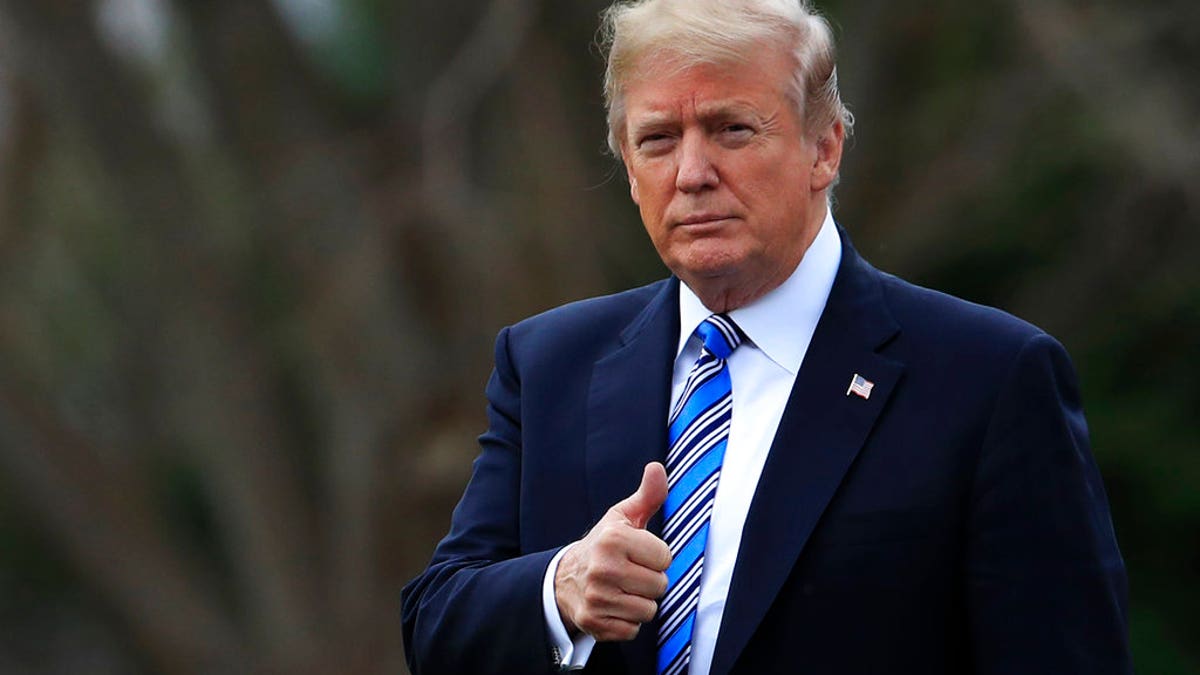
President Donald Trump gestures as he walks as he leaves the White House, Friday, Feb. 16, 2018, in Washington, for a trip to his private Mar-a-Lago resort in Florida. (AP Photo/Manuel Balce Ceneta) (Copyright 2018 The Associated Press. All rights reserved.)
President Trump is the best friend Africans have had in a long time.
That assertion might sound strange, especially since the president reportedly disparaged African nations using an obscenity in a recent meeting, causing an international uproar.
But the president's actions speak far louder than words. His America First policies are bolstering economies, reducing terrorism and increasing political stability across the continent.
Many pundits, diplomats, and foreign policy experts originally feared that the Trump administration would embrace isolationism. It hasn't. As President Trump made clear at the recent World Economic Forum in Davos, "America First does not mean America alone."
In fact, the White House's policies are fueling massive growth in many African nations – some of which already have fast-growing economies. The Ivory Coast, Tanzania, and Senegal were three of the 10 fastest growing economies in 2016, according to the International Monetary Fund World Economic Outlook. In 2017, Ethiopia, Djibouti and Tanzania rose to the top.
President Trump is well aware of this economic opportunity – and plans to capitalize on it. In September, in a speech to African leaders at the United Nations, the president highlighted the continent's "tremendous business potential." He called for America to increase trade and investment in Africa across a variety of industries – from agriculture to energy to health care.
The administration is following through. U.S. Trade Representative Robert Lighthizer has consistently expressed interest in establishing bilateral trade agreements with African nations. In fact, at the end of January he announced the United States will soon enter a free-trade pact with an African country yet to be selected. He said the deal will serve as a model for the rest of the continent.
Mutually beneficial trade doesn't just boost African economies. It also incentivizes African nations to implement economic reforms and increase transparency. That promotes stability and sound governance.
President Trump is also beefing up military partnerships with African countries. He recently approved the sale of $600 million of light attack planes to Nigeria, which will use the aircraft to combat terrorist groups like Boko Haram and the Islamic State.
And the administration is helping African nations resolve internal political struggles. The White House's National Security Strategy, released in December, stated that America would assist African countries to "end long-running, violent conflicts" and "promote effective governance, improve the rule of law, and develop institutions accountable and responsive to citizens."
These efforts are much needed. Consider the Democratic Republic of Congo – a resource-rich nation where extremist movements have emerged. Over the past few weeks, a series of protests have broken out against President Joseph Kabila. Dozens of the protesters have been arrested. Several have died.
This instability is of particular concern to the United States. The Democratic Republic of Congo offers enormous economic potential for our businesses and should be an important ally in battling violent extremism. And since it borders nine different nations, internal violence can easily spread to other areas.
Meanwhile, in South Sudan, refugees are fleeing their nation to escape a low-grade civil war. Over 1.6 million have been internally displaced. President Trump knows full well how this could destabilize the region, and this month banned exports of weapons to South Sudan.
By working strategically with African leaders, the U.S. government and private American companies could decrease domestic political strife. Solving such conflicts would save millions of Africans – while strengthening America's national and economic security.
U.S. politicians and pundits may fixate on the president's sometime rough language. But Africans aren't hung up on his words. They're thrilled that America First policies are improving lives across the continent.
